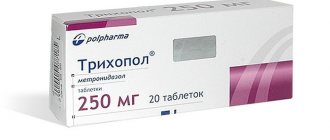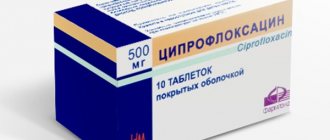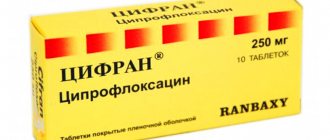01.08.2017
Cystitis is an inflammation of the bladder, the vivid clinical picture of which gives no reason to doubt the diagnosis either for an experienced doctor or for an adult.
Characteristic signs of inflammation are a frequent urge to urinate, emptying the bladder is accompanied by pain and the presence of blood in the urine. You need to get rid of cystitis; the disease worsens the quality of life, preventing you from working or resting. If measures are not taken in time, complications will arise, the disease will become chronic and will be plagued by regular relapses.
Those who believe that inflammation can be controlled by limiting the amount of fluid consumed should discard this idea. It is absolutely impossible to reduce the amount of liquid; on the contrary, the more water consumed, the better. It’s great if the liquid is acidified (cranberry juice, currant compote, etc.).
Thanks to the acidic reaction, an environment that is uncomfortable for bacteria will be created, and they will not be able to attach to the walls of the bladder, but will be washed out by the flow of urine.
And the more you urinate, the faster the infection will clear up. The technique helps, but is not used as the main therapy.
As with other diseases, treatment for cystitis can be divided into 2 areas:
- etiological (etiotropic). Therapy is aimed at eliminating the cause of cystitis;
- symptomatic. The goal of treatment is to eliminate unfavorable symptoms that bother the patient and disrupt the usual rhythm of life.
Basic treatment for cystitis
Unlike other diseases, in which it is sometimes difficult to determine the cause, with inflammation of the bladder, doctors know what they are fighting against. It has been established that certain bacteria cause cystitis, therefore, the basis of therapy is antibacterial drugs. It’s just not possible to accurately guess which bacteria led to the inflammation - you need to conduct a urine test. The essence of a urine culture test is to grow existing bacteria on a special nutrient medium and then determine the species.
The benefit of such an analysis is not only that pathogenic microorganisms can be identified, but also that their sensitivity to various antibacterial drugs can be determined. Unfortunately, it is not always possible to carry out such a diagnosis, and it is not indicated for everyone. Typically, urine is submitted for culture in cases of complicated, recurrent and hospital-acquired cystitis. The result will be received within a week.
But waiting such a period of time is sometimes harmful to health, and also painful for the patient. This is why a course of treatment is sometimes prescribed without waiting for diagnostic results. Of course, there is a risk of choosing the wrong medicine, but doctors prescribe a broad-spectrum drug from those that are active against most pathogenic microorganisms that can cause cystitis.
You should not prescribe treatment for cystitis yourself - this should be done by a doctor. He will select a medicine based on its benefits and safety, not based on the fact that the medicine is “the most powerful” or “has helped friends.”
If primary therapy is not effective, the doctor should not be considered an amateur. Next, you need to resort to clarifying the diagnosis and do not forget about symptomatic therapy.
Herbal remedies
Cystenium
The advantage of the drug is also its safety and a small number of side effects.
Herbal medicines are also used in the treatment of cystitis. The medicinal power of plants was noted by our ancestors, and modern medicine uses these developments, offering us combinations of necessary plant components in a form convenient for use. These are mainly products based on chamomile, cranberry, parsley, St. John's wort, which have anti-inflammatory and diuretic effects.
However, Phytolysin has its drawbacks . It is produced in the form of a paste, which has a specific taste, which does not always suit patients; in addition, the risk of allergies is quite high due to the abundance of plant components.
Caution should also be exercised when using the medication simultaneously with anticoagulants, or if you are allergic to salicylates and NPS.
Main advantages:
But the disadvantages of the drug are the increased risk of an allergic reaction (due to the large number of components) and the need for long-term use before the desired effect occurs (the duration of treatment can be up to 6 weeks).
The list of medications for cystitis in women is quite large, since cystitis is considered a female disease (according to doctors, 80%) due to the structure of the female genital organs. There are different reviews about drugs on the Internet, each forum contains a lot of different opinions. But still, most users advise asking specialists about what medications are available to treat cystitis in women.
- nasal polyps;
- bronchial asthma;
- nausea or vomiting, increased anxiety;
Canephron
The disadvantages are
The composition of Canephron is not so diverse (lovage, rosehip, rosemary and centaury). But the action of this remedy is similar to the action of Cyston.
Only after this the most suitable drug is selected and the order of its administration is determined so that the effect is only positive and as fast as possible.
Symptomatic treatment for cystitis
Symptomatic therapy, like basic treatment, should be prescribed by a doctor, since it can be both useful and harmful. In the first case, you can drown out unpleasant symptoms, forgetting about discomfort and pain. In the second case, the problem is masked, and the person believes that perhaps he is healthy and there is no need to be treated for cystitis. This is a fundamentally wrong approach that will lead to complications and relapses of the disease. It is important to carry out the entire course of treatment recommended by the doctor, and then get tested to make sure that the problem is resolved.
The great benefit of symptomatic therapy is that many drugs can eliminate muscle spasms and inflammation, and restore blood circulation. This means that thanks to the symptoms, the bladder begins to actively fight inflammation. Moreover, according to comparative studies of the effects of antibiotics and anti-inflammatory drugs, the latter are no less effective than the former.
The study involved 2 groups of patients. Participants in the first group were given the antibacterial drug Ciprofloxacin, and the second group was given a drug from the NSAID group Ibuprofen. After a week, 75% of people from the first group felt completely cured, and 60% of test participants from the second group said the same. 30% of patients taking Ibuprofen experienced a recurrence of cystitis.
After this study, recommendations were made to treat cystitis on the first day with symptoms. If this does not give the desired effect, then antibiotics are added. If the patient has tumors, bladder stones, or a history of surgery, then antibiotics are prescribed immediately. Considering the increase in antibiotic resistance, as well as possible side effects, the doctor chooses drugs carefully.
Previously, a long course of treatment for cystitis was prescribed with small doses of antibacterial drugs; today antibiotics can be taken only if other treatment options have not been successful.
Selected recommendations
When taking this drug, doctors advise following certain rules:
- The effect will come faster if you take the tablet with warm water. And in case of cystitis, you should give preference to sour compotes and fruit drinks, for example, from cranberries.
- If it is impossible to see a doctor in the first days of the disease, try to at least drink more fluids.
- In case of any ailments or deterioration in health, you should see a specialist as soon as possible. In this case, it is better to stop taking any drugs from the NSAID group.
- If you have a history of problems with the gastrointestinal tract or your stomach hurts after taking the pill, then you should take Omeprazole along with Ibuprofen. It will reduce the secretion of hydrochloric acid and protect the gastric mucosa from the aggressive effects of the drug. “De-nol” has a similar effect.
The benefits and harms of anti-inflammatory drugs
As stated above, symptoms have become a powerful weapon against cystitis. But if you use it incorrectly, you can get harm instead of benefit. If you take painkillers uncontrollably, it only masks the disease. You need to be treated comprehensively - antispasmodics, anti-inflammatory drugs, herbal medicines, immunomodulators, probiotics, estrogen substitutes. A specialist selects a set of procedures and medications based on medical history, the patient’s condition and age, and other significant nuances.
Medicines from the NSAID group actively suppress inflammation, relieve symptoms of the disease - relieve swelling and impaired microcirculation, reduce pain and muscle spasms, eliminate malfunctions of the bladder. The group of drugs includes a large list of drugs. For example, greater anti-inflammatory activity is characterized by Indomethacin, minimal - by Aspirin, Ibuprofen.
Ketorolac and Ketoprofen are good for pain relief, but Ibuprofen and Naproxen are bad. It is undesirable to take NSAIDs for a long time, since adverse reactions from the gastrointestinal tract are possible.
Overdose
If the drug is used in high doses, the following conditions will occur:
- Low pressure.
- Depression.
- Headache.
- Bradycardia.
- Noise in ears.
- Painful sensations in the abdominal area.
- Drowsiness.
- Vomit.
- Lethargy.
- Nausea.
In severe cases, respiratory arrest and coma may occur. You should stop taking Ibuprofen if these symptoms occur, then go to the hospital.
How does Ibuprofen work for cystitis?
Doctors often prescribe Ibuprofen for cystitis - it acts against pain and inflammation, relieves fever. The drug is classified as a non-narcotic analgesic with pronounced activity against inflammation. WHO included the medicine in the list of essential drugs. It is important to note that the medicine is well suited if cystitis is caused by an external infection that has entered the bladder through the urinary tract. If the disease is caused by kidney pathology, it is risky to prescribe Ibuprofen.
The dosage of the drug is selected by the doctor individually, taking into account the patient’s age, severity of the disease, and other important factors. The course usually lasts a week, the standard daily dose is 400 mg 3 times a day. It is more convenient to take the medicine in tablets.
The first dose of tablets is in the morning, before meals, with plenty of liquid. Subsequent doses are after meals. You can take a maximum of 400 mg of Ibuprofen once, the next dose no earlier than 4 hours later. Self-administration of the medication is not advisable, but is possible if it does not exceed 5 days. A child from 6 to 12 years old can be given 1 tablet 4 times a day, the main thing is that his body weight is more than 20 kg. The breaks between taking tablets should be about 6 hours. There is no difference between drugs from different manufacturers, so the pharmacy can be guided by price and personal preferences. Analogs of Ibuprofen are: Nurofen, Advil, Solpaflex, Ibuprom, MIG 400.
Some of the side effects of Ibuprofen include:
- asthma, shortness of breath;
- swelling, rash;
- malfunction of the gastrointestinal tract, problems with the kidneys and liver;
- increased blood pressure, dizziness and headaches;
- insomnia and drowsiness, fatigue;
- anemia;
- rhinitis;
- hearing problems, etc.
As for the effect on laboratory parameters, it will be as follows:
- bleeding takes longer;
- the concentration of glucose, hemoglobin, and hematocrit in the serum decreases;
- transminase activity increases;
- the content of creatinine in the blood increases.
Despite the wide range of adverse reactions, Ibuprofen is quite effective, which is why it is often prescribed in various fields of medicine.
Considering that with cystitis a person wants to quickly get rid of unpleasant symptoms, many are interested in how long it will take for Ibuprofen to start working. It all depends on the form of release, but in general the medicine begins to act quickly, within about an hour.
Side effects
During the course of therapy, the following adverse reactions are possible:
- Dyspnea.
- Anemia.
- Increased sweating.
- Bronchial spasm.
- Aphthous type of stomatitis.
- Hearing impairment.
- Tachycardia.
- Increased pressure.
- Tinnitus.
- Irritation of the oral mucosa.
- Hallucinations.
- Eye irritation.
- Swelling of the conjunctiva.
- Depression.
- Headache.
- Excitation.
- Dryness of the mucous membranes of the eyes.
- Anxiety.
- Drowsiness.
- Dizziness.
- Confusion.
- Dry mouth.
The appearance of these symptoms is an indication to discontinue treatment. It is recommended to seek help from the nearest medical center.
The occurrence of adverse reactions may affect driving. Care must be taken when using a car or other complex machinery.
Ibuprofen for pregnant women and children
In childhood, Ibuprofen can also be prescribed; children under 6 years of age are given it in syrup, given that the drug is strong and can cause unwanted reactions. Pregnant women are prescribed Ibuprofen only in exceptional cases, if the risks to the mother and fetus are greater than the adverse reactions from the drug. When it comes to the last trimester, it is better not to use Ibuprofen at all during this period. The risk is that the active substance of the drug can provoke abnormal development of the fetus, cause miscarriage or cause heart disease in the fetus. Therefore, if in exceptional cases a medicine is prescribed, it must be in small doses and under the supervision of physicians.
During the first 2 trimesters of pregnancy, taking into account indications, Ibuprofen is prescribed because it does not cause bleeding and the threat of premature birth. Why is it contraindicated in the 3rd trimester? Because it stops the contraction of the muscles of the uterus, provokes pulmonary hypertension in the child, and blocks the production of hormones responsible for the process of childbirth. However, compared to other antipyretics and analgesics, it is safer in early pregnancy.
It is also not advisable for nursing mothers to take Ibuprofen, since it can pass through milk into the baby's body, causing harm to it. If it is very necessary to prescribe this drug to the mother, doctors recommend that she interrupt feeding during the course of therapy.
How does Ibuprofen work with other medications?
The compatibility of Ibuprofen with other drugs should be carefully assessed before starting treatment. It can enhance the effect of some, and neutralize or significantly reduce others. In addition, Ibuprofen affects vital processes, so attention is required from both the doctor and the patient. The first should provide for the development of adverse reactions, the second should monitor the health status and immediately notify the doctor if adverse reactions are detected. Be sure to notify your doctor about all medications you are currently taking.
An important point is to find out how Ibuprofen affects the ability to drive in particular and concentrate in general. And this must be taken into account, since the drug can reduce the reaction rate and disrupt concentration. Therefore, everyone who works in transport or with complex mechanisms should know that during the treatment period they should be extremely careful. Of course, not everyone develops this side effect, but it does occur.
About the drug
It should immediately be noted that Ibuprofen is part of symptomatic therapy, reducing inflammation and alleviating the condition of patients, but in no way affects the microbial flora that causes infectious pathology. Therefore, ibuprofen cannot completely replace antibiotics. Even if after taking the drug the signs of the disease disappear completely, this is not a reason to cancel the main therapy for the disease. Otherwise, relapses of cystitis are inevitable.
The high anti-inflammatory, analgesic and antipyretic activity of ibuprofen is provided by the active substance with the same name. The drug is available in different forms, which makes it possible to prescribe it to a wide range of patients, including very young children. For cystitis, these can be tablets, suppositories, suspensions, powder mixtures, gels and ointments for rubbing into the lower back.
British chemists have developed a new form of ibuprofen in the form of a small transparent patch that sticks to the skin. Under the influence of heat, the active substance is released and acts in the body for 12 hours. Moreover, the concentration of ibuprofen is tens of times higher than its dose in other dosage forms. The constant rate of entry of drugs into the body eliminates overdose and the development of undesirable effects.
Ibuprofen: reviews
In general, judging by the reviews of doctors and patients, Ibuprofen cannot be classified as a problem-free drug. It can affect your well-being and is difficult to combine with many other medications, but despite this, it is still prescribed because it gives the desired result quite quickly. The reviews note a large selection of forms of the drug, which allows you to accurately dose the drug; also an important factor in the choice is the low price and speed of action.
To summarize, it can be noted that cystitis is a disease mostly affecting women; people suffer from it, regardless of age category. To prevent the development of an inflammatory process in the bladder, you need to maintain personal hygiene, adjust your diet, be selective in sexual relations, and dress appropriately for the weather.
Treatment will be effective if you approach the issue comprehensively, using both modern medicines and traditional medicine recipes as prescribed by a doctor. An experienced specialist will be able to navigate the symptoms and choose adequate treatment taking into account all factors.
Dosage form, composition
The pharmacological industry produces the drug Ibuprofen in several forms:
- biconvex tablets of 200, 400 and 800 mg of active substance;
- homogeneous suspension with sweetener in bottles with a measuring syringe (5 ml = 100 mg of active component);
- Liniment 5% in a tube of 25 g.
The active component of any form of medicine is the substance - ibuprofen. Auxiliary components enhance and consolidate the effect of the substance, and also differ depending on the pharmacological form of the drug. Common ones are magnesium stearate, colloidal silicon dioxide, starch, sodium hydroxycarbonate, gelatin, sucrose.









